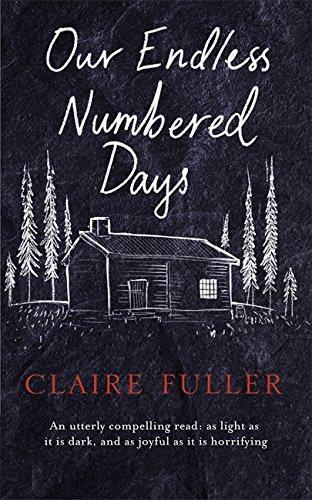 As I prefer to open a book knowing the bare minimum about it (yes, that is weird coming from someone who constantly recommends books but at least I don’t do spoilers), I am very influenced by titles and a beautiful and intriguing one like Claire Fuller’s Our Endless Numbered Days is guaranteed to attract my attention. (It’s actually the name of a 2004 album by Iron & Wine, which I hadn’t heard of.) Of course, an excellent title only gets the author or the reader so far and it’s very satisfying when it turns out to belong to a novel such as this debut, which earned the author a place in the Observer New Faces of Fiction 2015, my own Hot Picks 2015 and many other selections of exciting new releases. In this unusual and sometimes harrowing coming-of-age story Claire places her characters in extraordinary – extreme – circumstances and I invited her to shed some light on the process (my mini-review follows):
As I prefer to open a book knowing the bare minimum about it (yes, that is weird coming from someone who constantly recommends books but at least I don’t do spoilers), I am very influenced by titles and a beautiful and intriguing one like Claire Fuller’s Our Endless Numbered Days is guaranteed to attract my attention. (It’s actually the name of a 2004 album by Iron & Wine, which I hadn’t heard of.) Of course, an excellent title only gets the author or the reader so far and it’s very satisfying when it turns out to belong to a novel such as this debut, which earned the author a place in the Observer New Faces of Fiction 2015, my own Hot Picks 2015 and many other selections of exciting new releases. In this unusual and sometimes harrowing coming-of-age story Claire places her characters in extraordinary – extreme – circumstances and I invited her to shed some light on the process (my mini-review follows):
Imagine you’re spirited away from your house without warning, leaving behind its central heating, fridge freezer and close proximity to a supermarket, and you’re dropped beside a cabin in a remote forest. You’re not interested in escaping, but you do want to survive. What would your essential requirements be and how would you manage?
Deciding how difficult to make life for my characters in their cabin in a forest was one of the best bits of writing Our Endless Numbered Days. There were hundreds of decisions to make, and each one had massive implications for the story and characters; whether they lived or died.
Firstly food and water: I needed my characters to be able to get through the severe winters and to find enough food, but novels are all about tension, so I didn’t want to make life too cosy for them. I wrote them an axe, a knife and a gun. And then I took the gun away. (You can do that if you’re a writer.) I think I was quite generous – I gave them a bag of rice to get started, a fishing rod and some seeds for when the spring came. But then, since I also controlled the travel arrangements and the weather, I had them arrive at the cabin in late summer, and gave them the worst winter ever. Their food sources – the berries, mushrooms, squirrels, rabbits and fish – disappeared. I let them have a month or so of preparations before the really bad weather hit, so they were able to chop some wood and dry some squirrel and rabbit meat. But then, half way through that first winter I had them realize they had miscalculated the amount of food they would need, and they faced starvation.
They lived near a river; easy access to water you might think. But the closest point to the river was a high ledge so that buckets had to be lowered and lifted, and then carried up to the cabin. How many buckets my characters should have was another decision I considered carefully. Too few and they would spend all their time going back and forth to the river; too many and it wasn’t enough of a challenge. With three they were able to have one tied permanently by the river, and two to carry the water. (Later, one of these was lost.)
The next thing to consider (although of course, I didn’t make decisions consecutively, but all in a jumble) was warmth. There was a stove in the cabin which they used for cooking and for heat, but no blankets. Conveniently you could say, my characters arrived fully dressed with dungarees and coats and shoes, but I couldn’t let them have it quite that easy, so one of them lost a shoe before she even made it to the cabin. I’m not much of a planner when I write, and sometimes I write things which surprise even me – like the losing of a shoe – and then have to deal with the consequences throughout the rest of the novel. And the consequences can be huge. What do you do if you only have three pieces of footwear between two people? Shoes can be shared, but then only one person at a time can go outside in winter, which makes it very difficult to hunt large animals, which means you have to hunt or forage every day. Or shoes can be improvised from roof shingles and fur, but what if the fur rots? Or you can go bare-foot, but what if you have to run away from something very fast?

So, back to that ‘Desert Island Disc’ question I started with. After all my thinking and research I like to imagine I’d do alright if I was air-lifted from my comfortable sofa and dropped in a forest. How about you?
Many thanks to Claire for joining me on my comfortable Literary Sofa today and making us think about all the things we take for granted, just as the novel does.
IN BRIEF: My View of Our Endless Numbered Days
It is rare for me to be able to write about a book I read months ago without looking at it again or referring to my notes, and it’s a good sign. With this novel, Claire Fuller demonstrates great flair in two of the key areas by which fiction stands or falls: creating an immersive and believable world – in this case, one in which civilization itself fades from view – and bringing to life a protagonist the reader really cares about. Peggy and her experiences in the forest, in all their beauty and horror, were so vivid and visceral that I was moved, distressed and fraught with anxiety about what was going to happen to her as the story progressed. Apart from the journey to Germany, where my interest flagged a little (maybe I’m just an impatient traveller), the pacing and building of suspense were handled very well, the denouement breathtakingly so. And if all that weren’t enough, the writing has a spare beauty that I absolutely loved – this is a novel that will stay with me for a long time.

